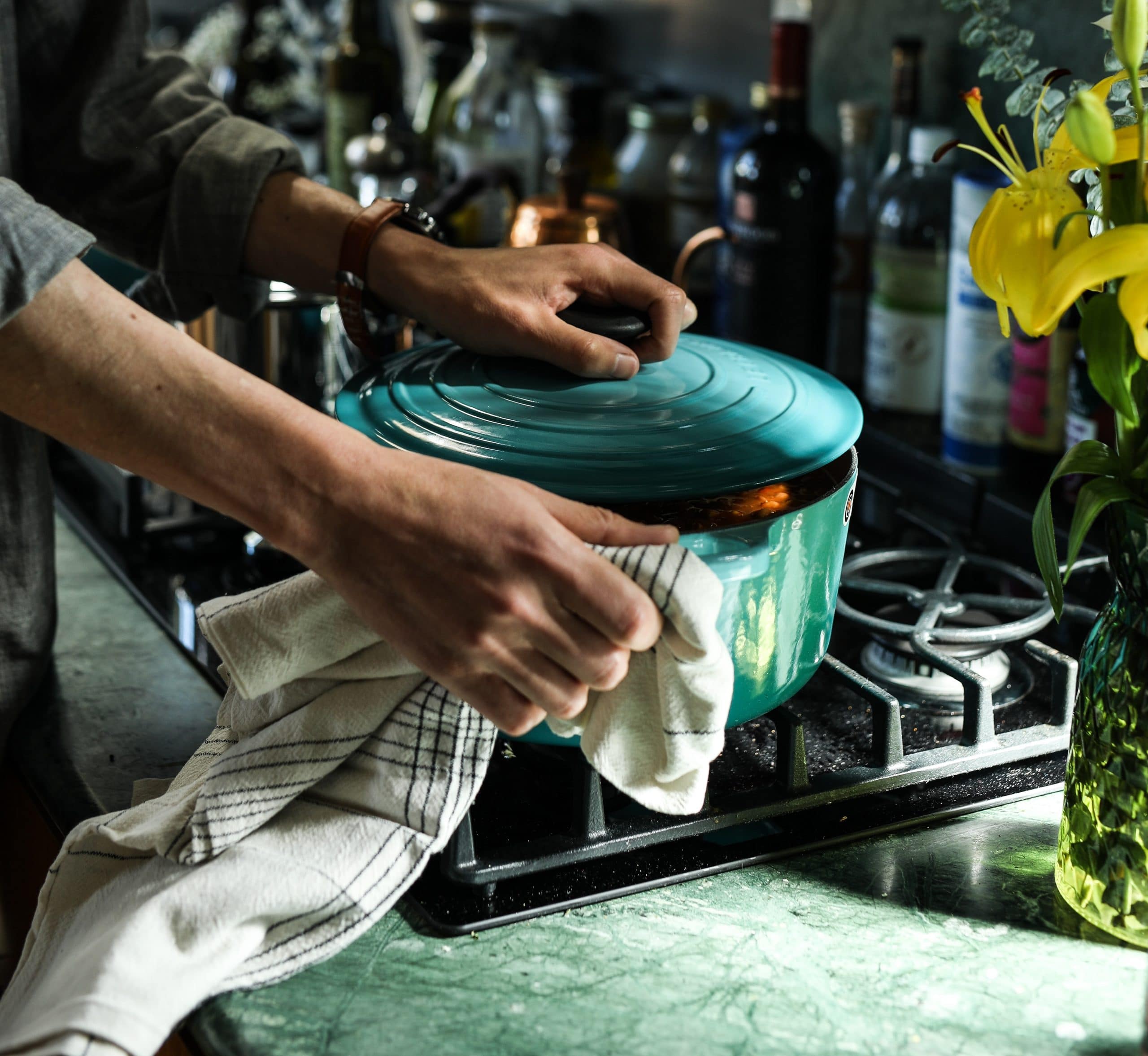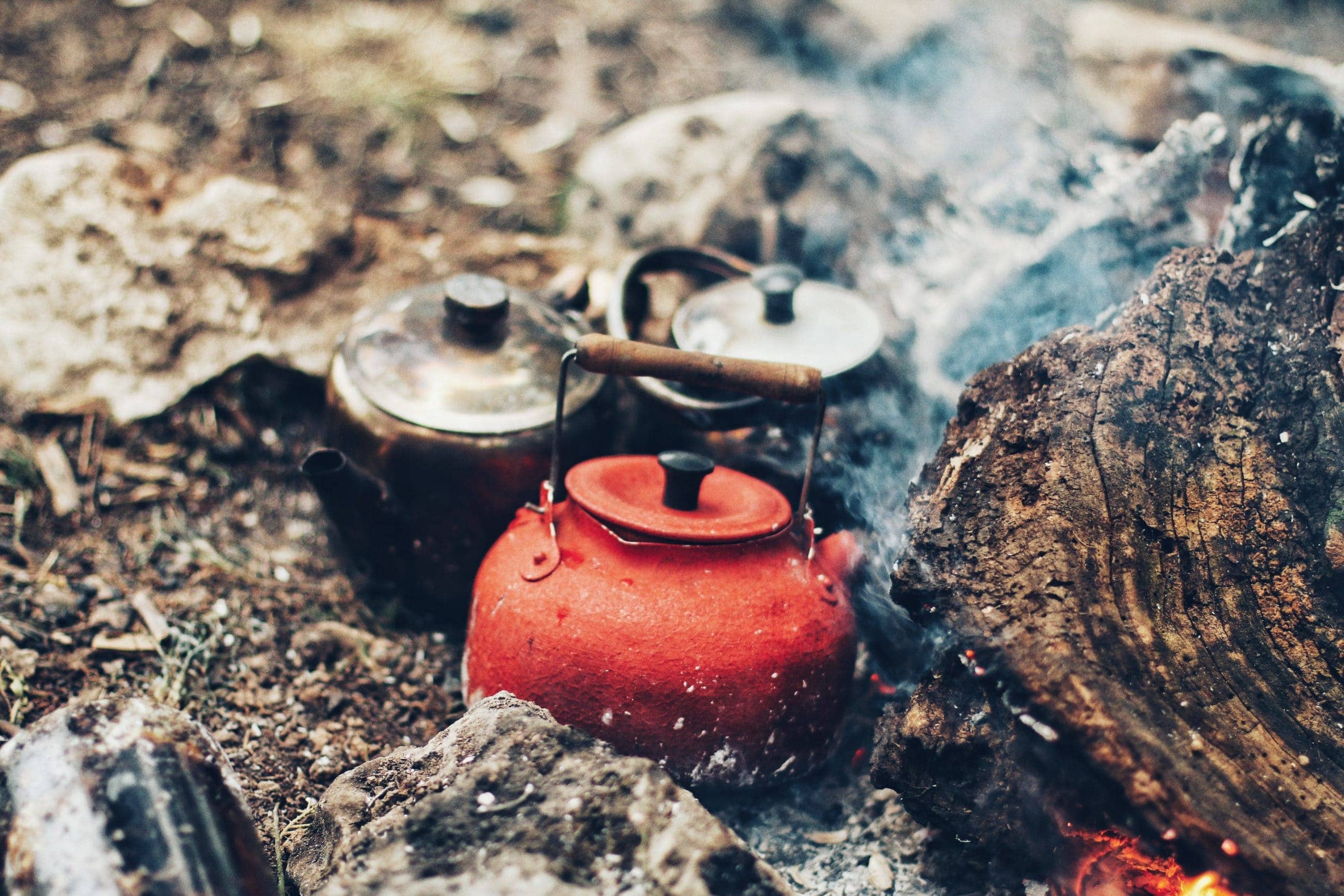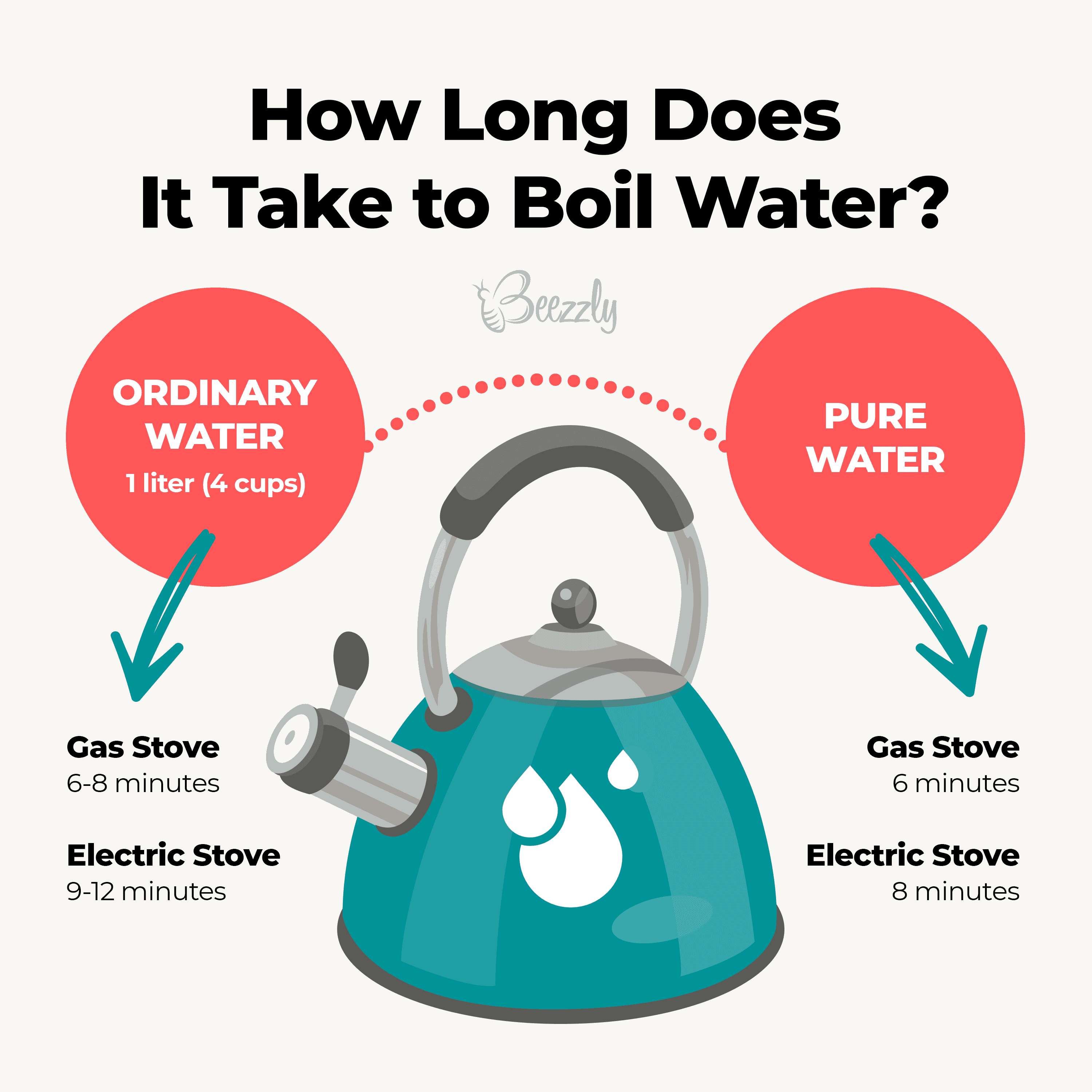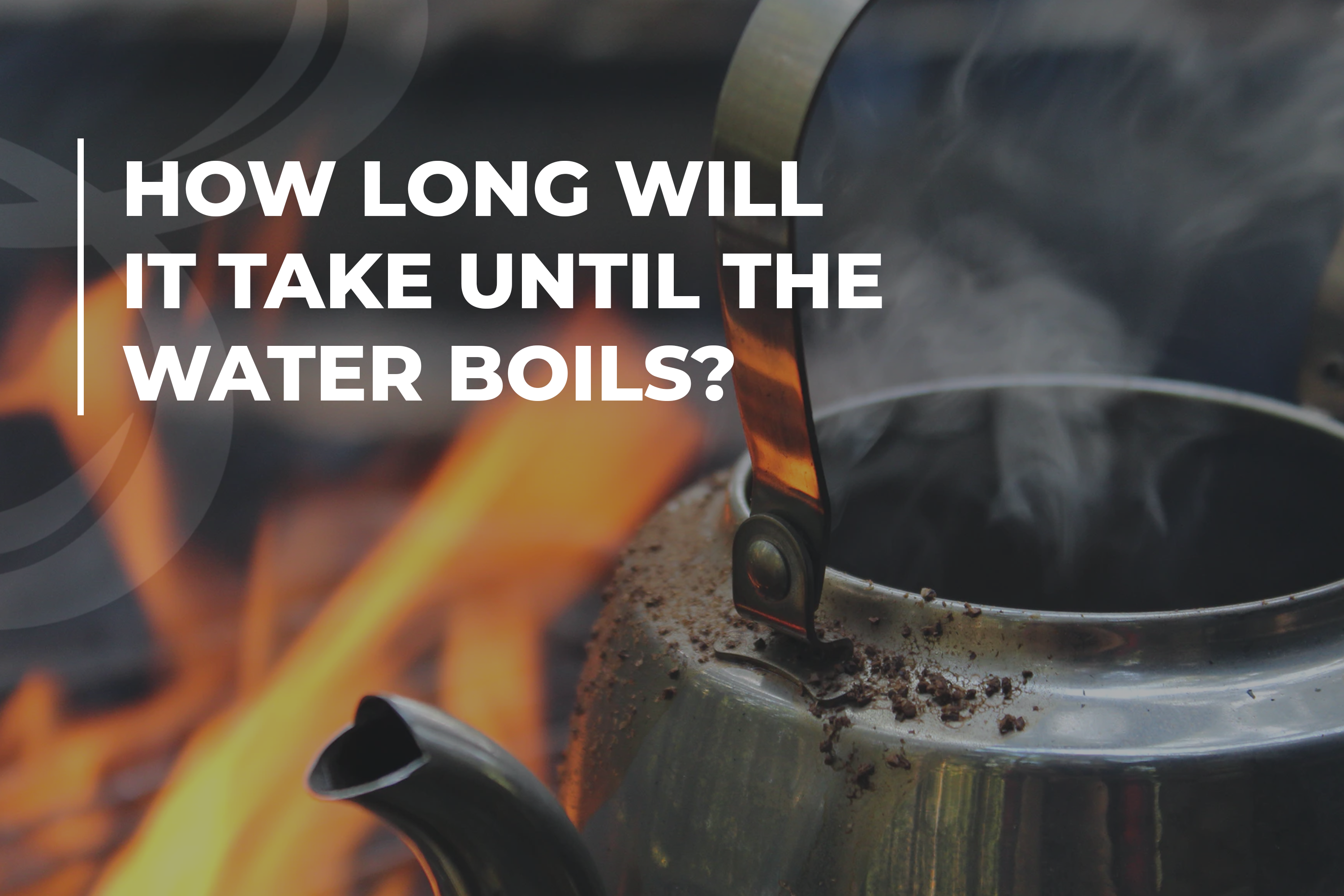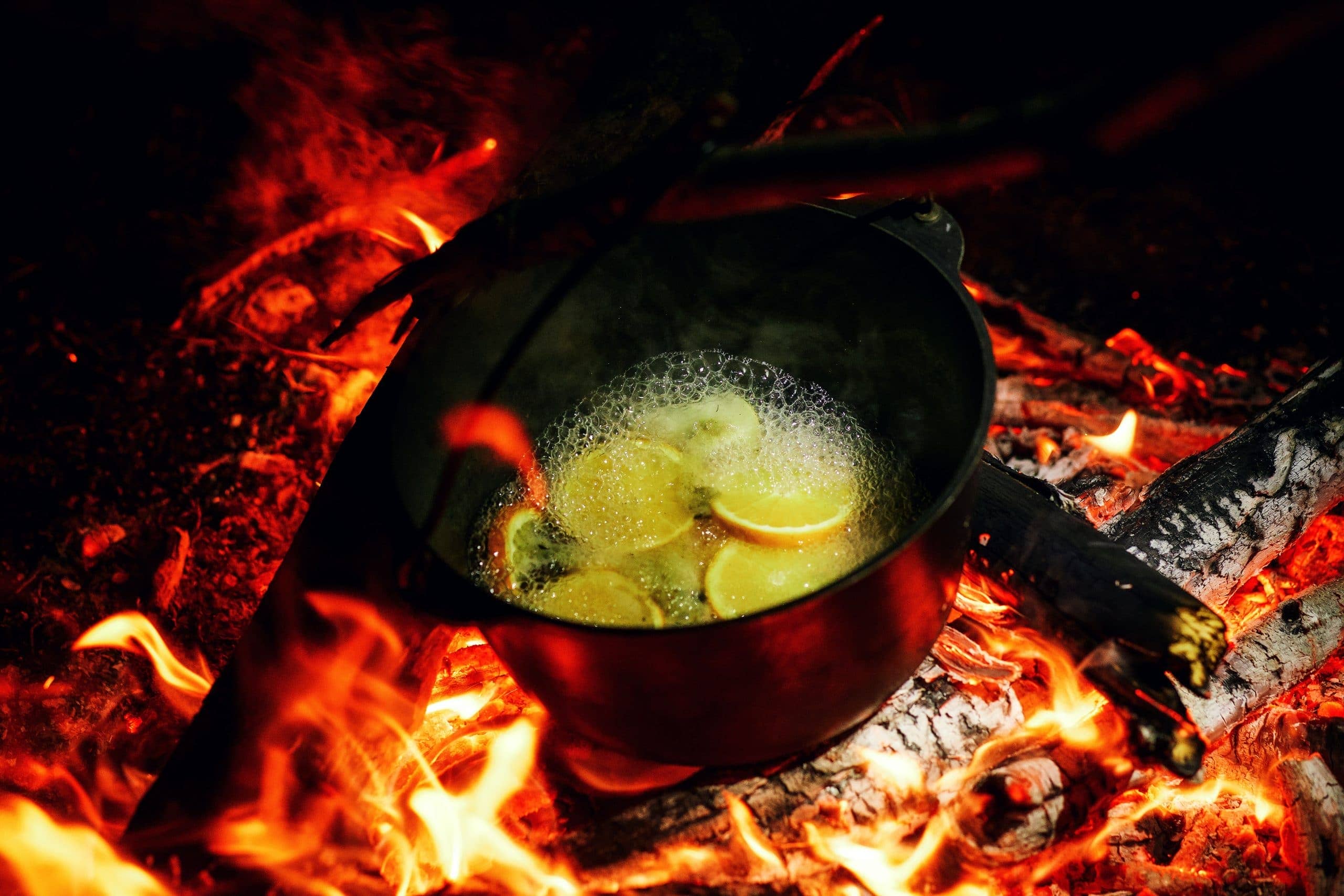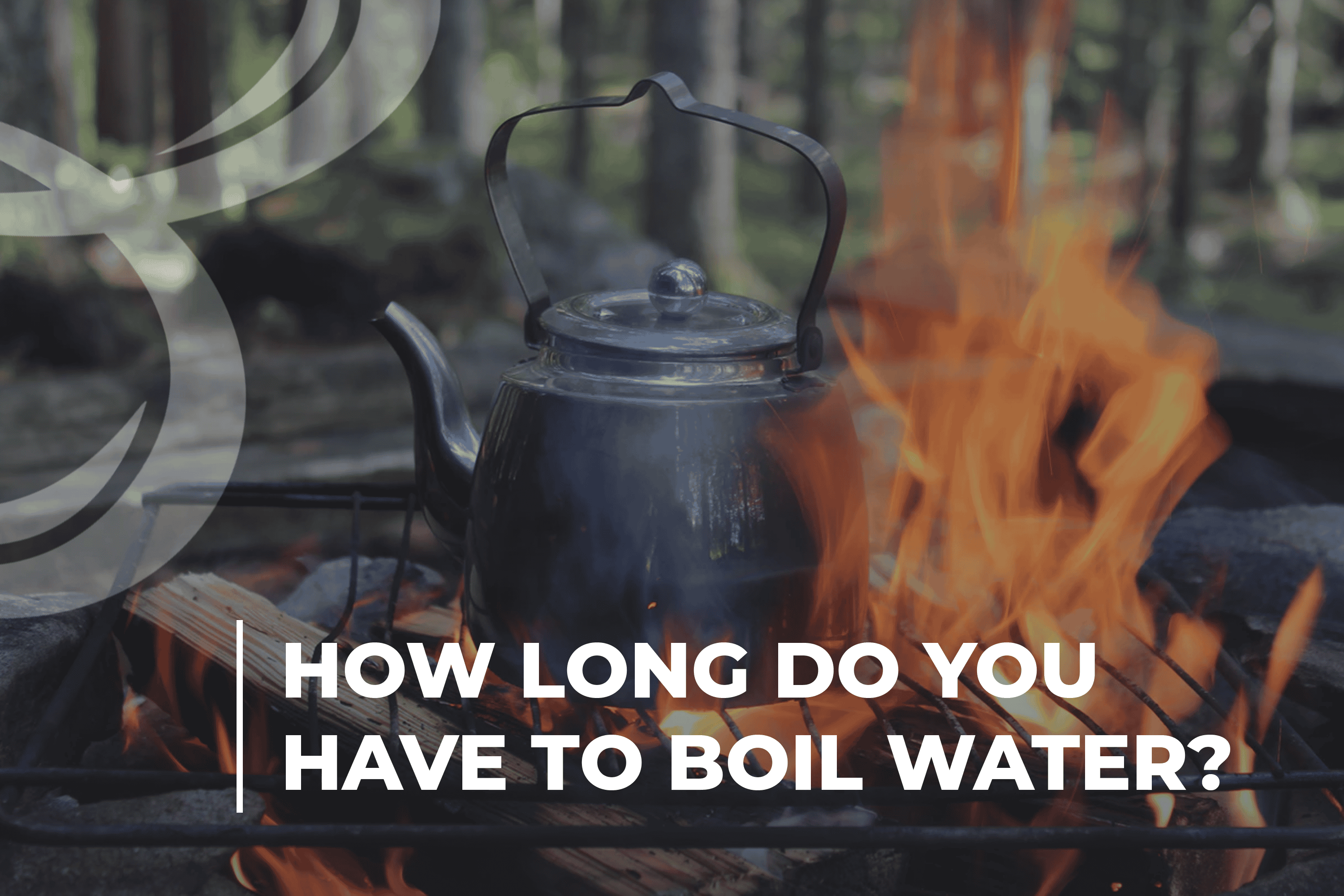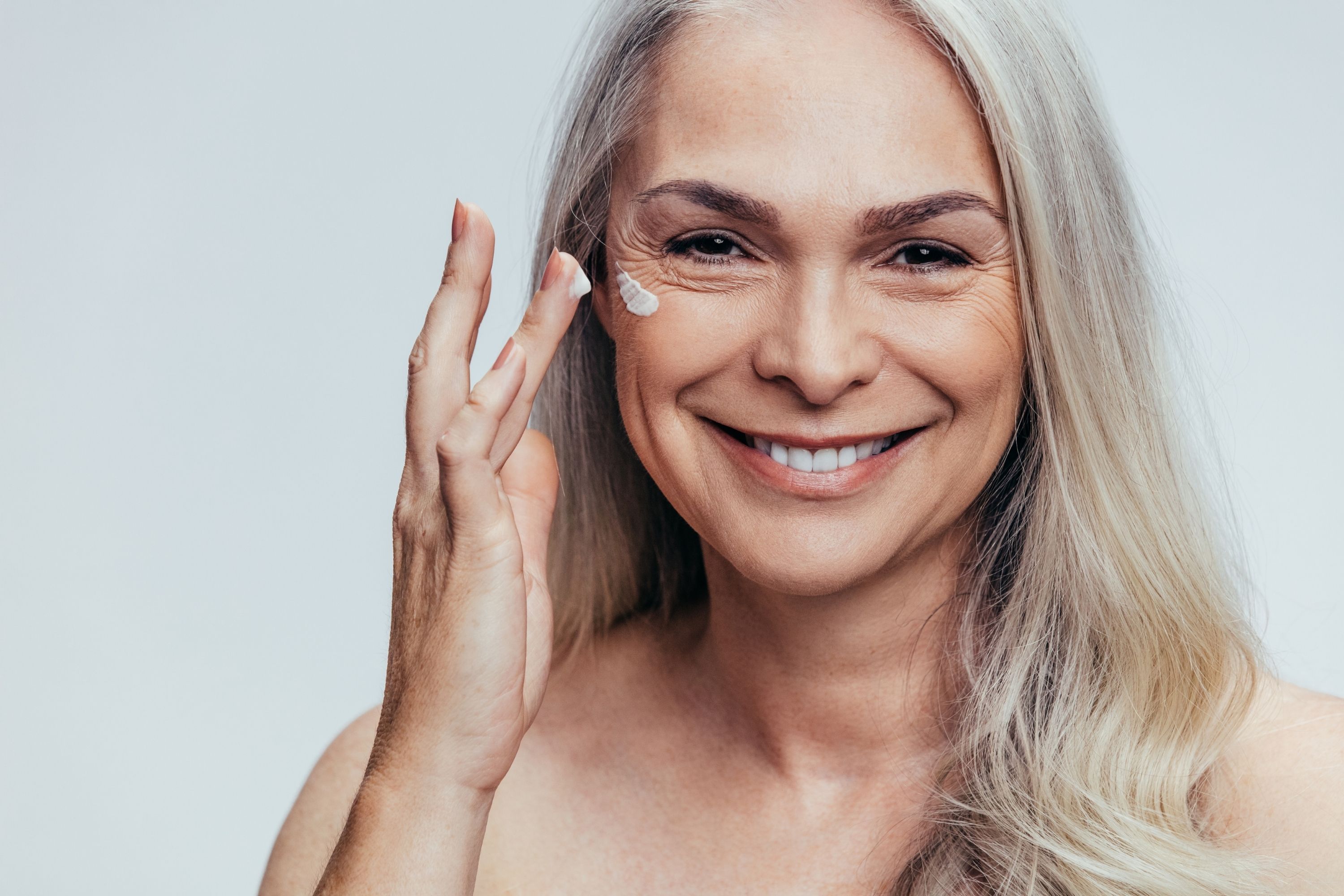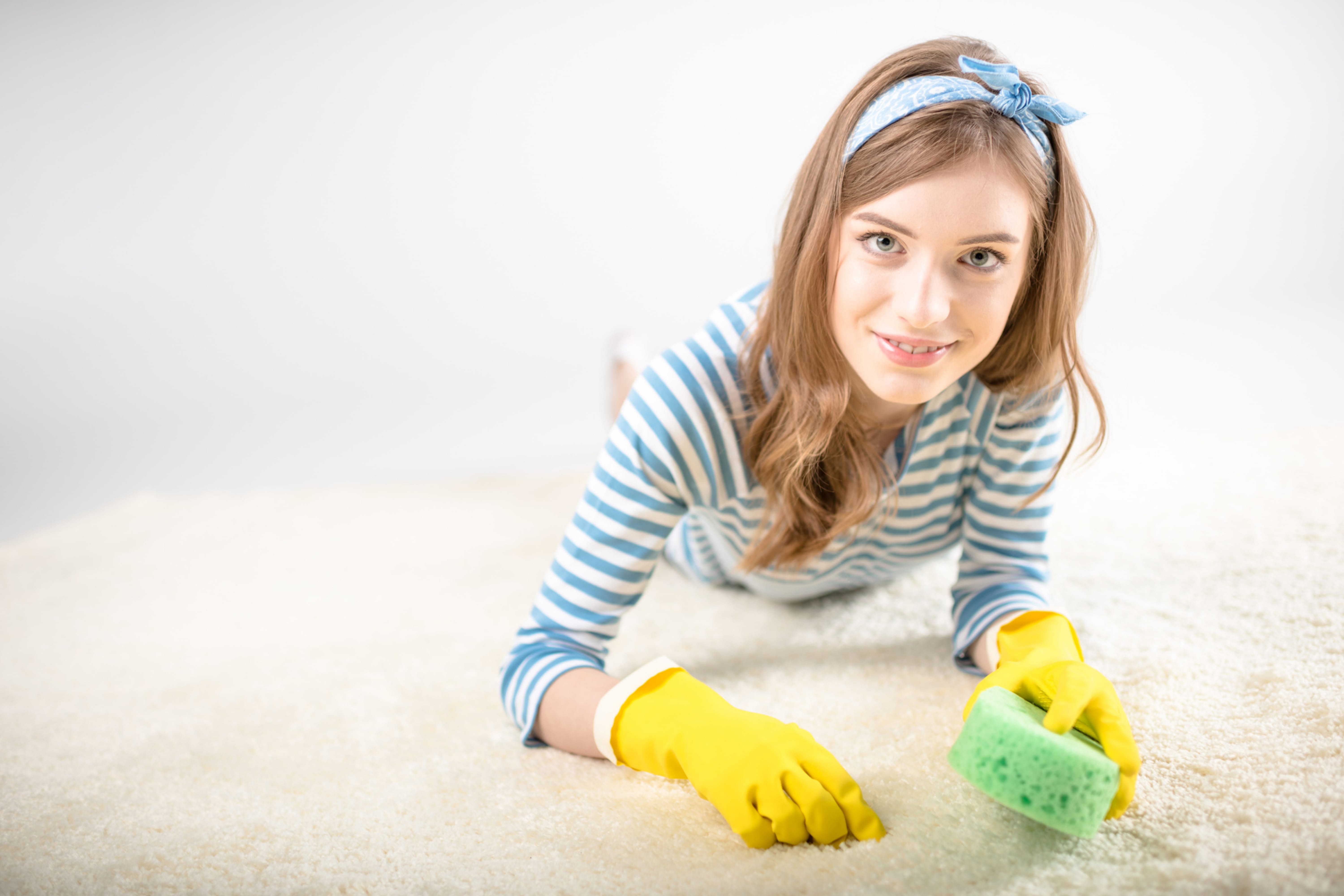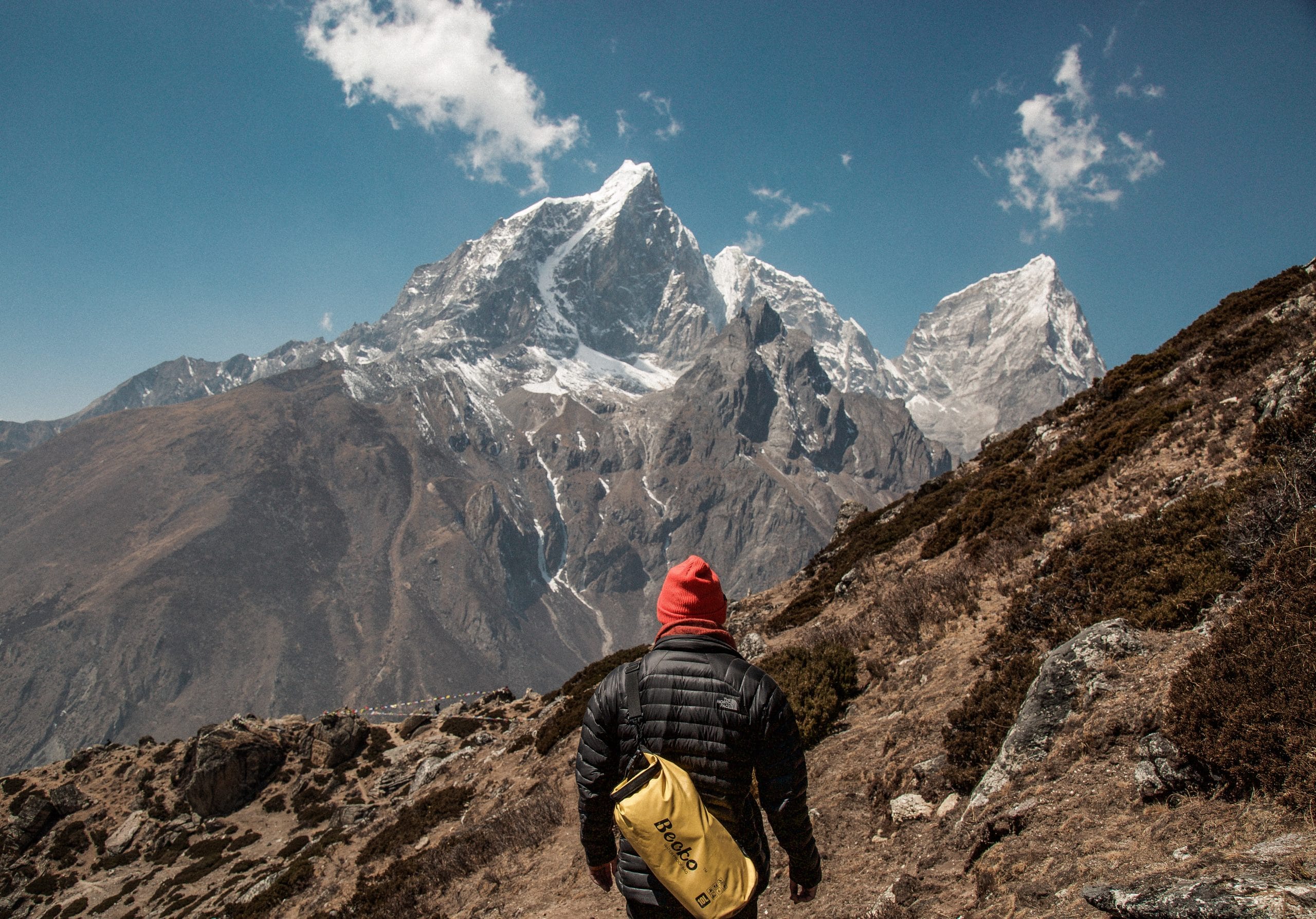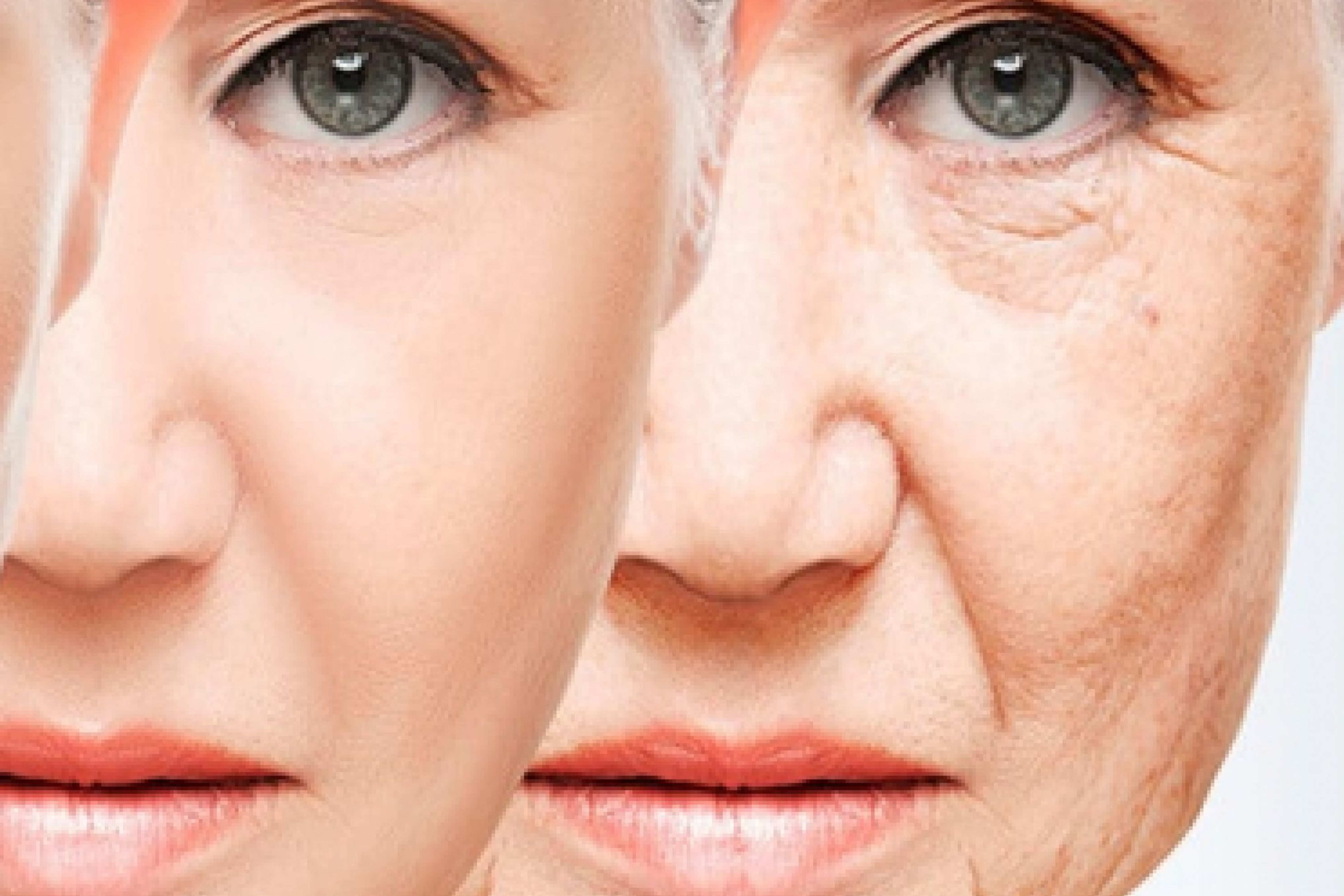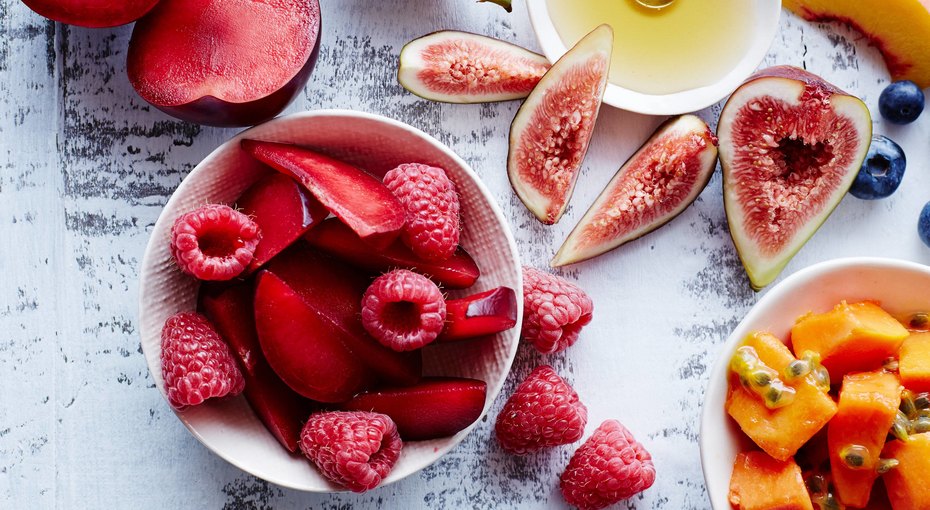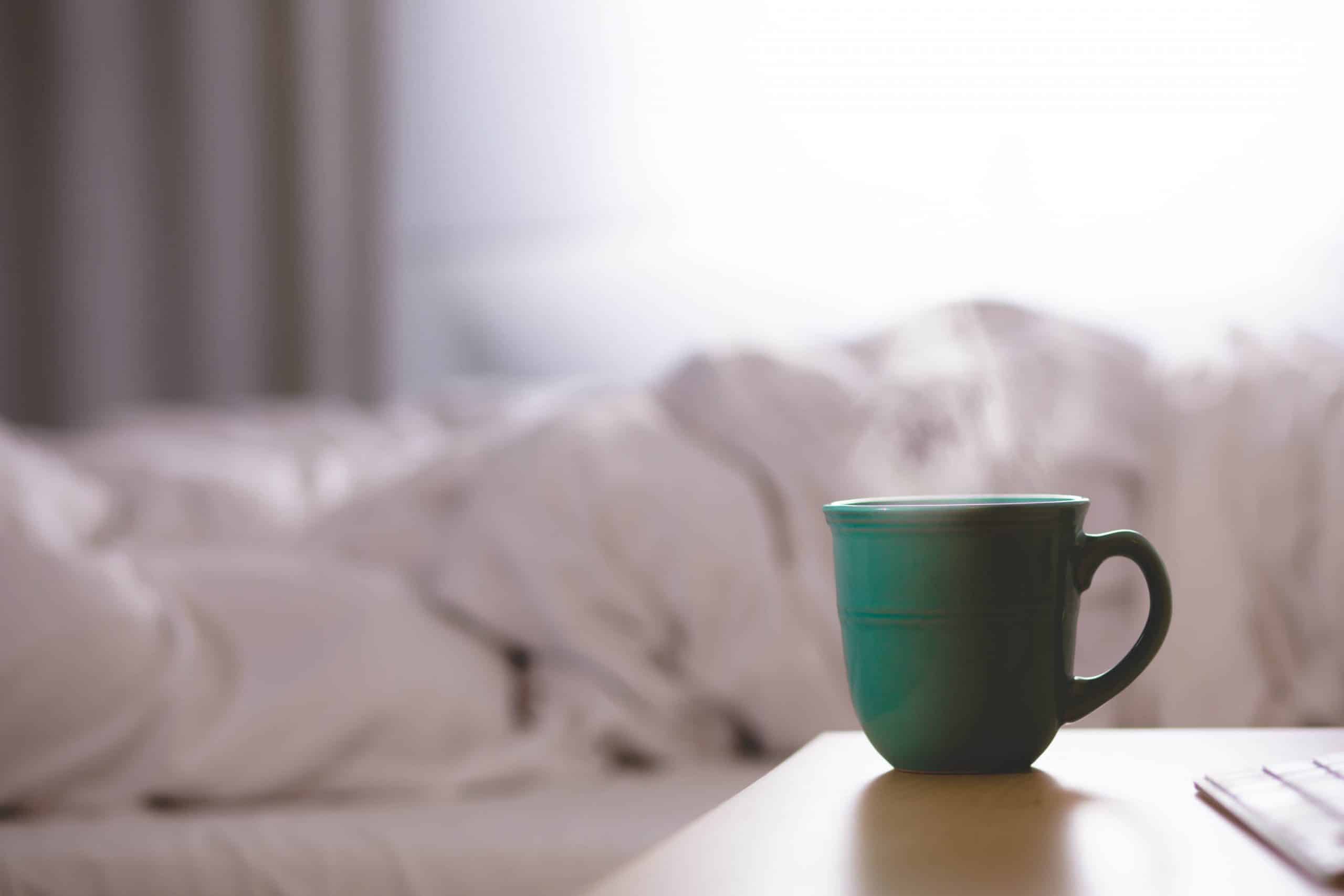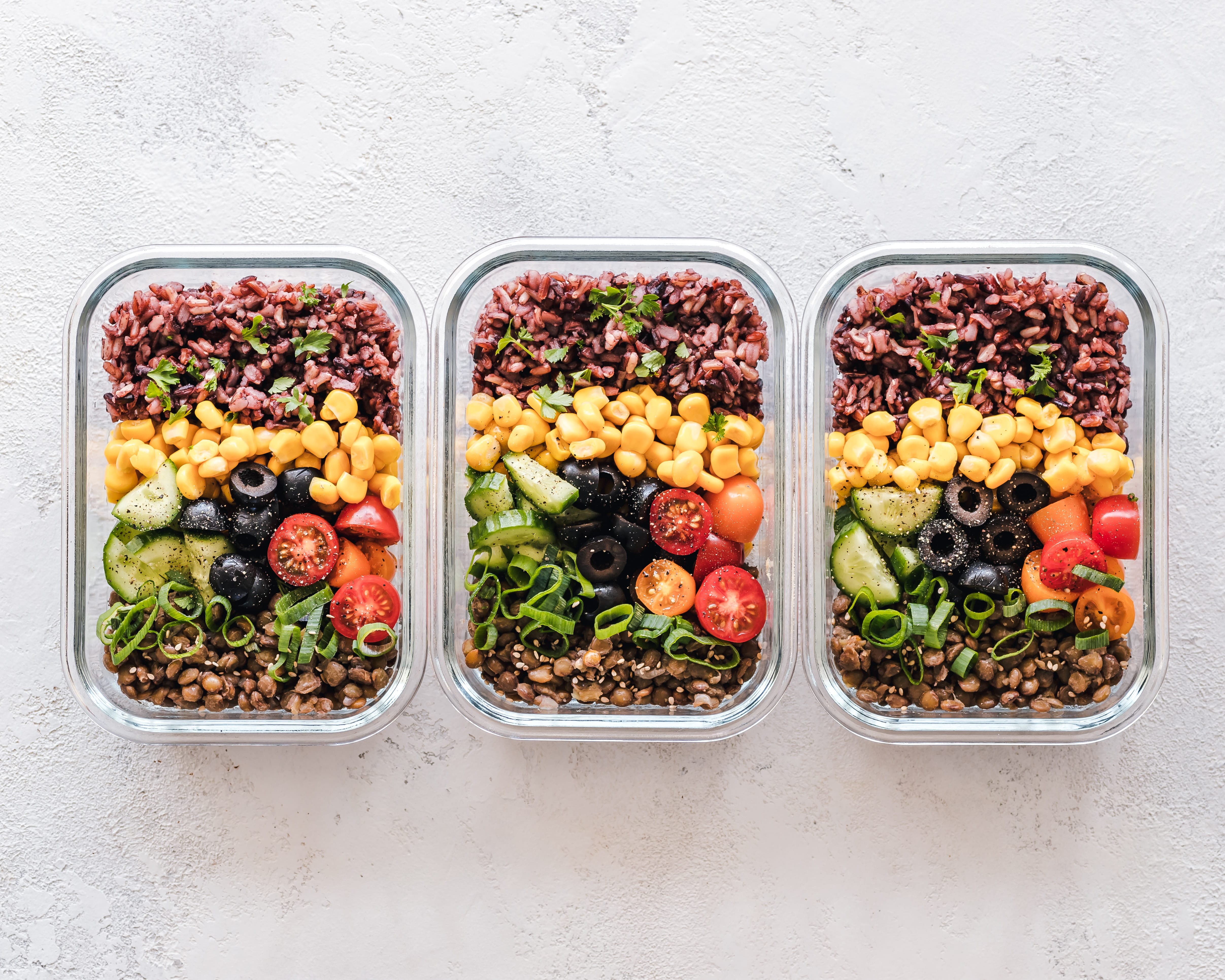We simmer water every day and even several times a day. And we are so used to this simple procedure that hardly ever wonder about the water boiling time.
However, this information may be useful, for example, when cooking and in many other situations.
So, How long does it take for water to boil? 1 liter of ordinary tap water will boil after 6-8 minutes at a gas stove and from 9 to 12 minutes at the electric stove. If the water is pure, it will be 6 minutes at a gas cooker and 8 minutes at an electric stove.
Two Basic Boils
When cooking, the art of boiling water is often overlooked, but it’s a crucial step in many dishes. We make a distinction between a gentle simmer and a vigorous boil, each with its own purpose.
A slow boil, or simmer, is like a gentle whisper. The water bubbles softly, covering the surface with big, slow-moving bubbles. This soothing temperature of 205°F (96°C) is perfect for coaxing flavors from delicate sauces, soups, and braises.
In contrast, a full boil is like a joyful shout! The water erupts in fast-moving, rolling waves of bubbles, releasing steam and energy. This lively temperature of 212°F (100°C) is ideal for cooking hearty pasta, potatoes, or other ingredients that need a boost.
Simmering vs Boiling
Simmering and boiling are two different cooking techniques. Simmering is a gentle, soft heat (180°F – 190°F) that coaxes flavors from ingredients. Boiling is a lively, rolling heat (212°F) that energizes dishes.
Bubbles and Boiling
Don’t be fooled by bubbles! They don’t always signal that water has reached a boil. In fact, bubbles can start forming when water is still a chilly 160°F (71°C). That’s just the water’s way of releasing pent-up gases or responding to the pot’s warmth. So when you notice bubbles clustering around the pot’s edges, don’t jump to conclusions.
But, how can you be sure water has really reached a boil? Look for a vigorous, rolling boil or check the temperature with a trusty thermometer. When it hits 212°F (100°C), you’ll know the water has reached its boiling point!
How long does it take for water to boil?
In this article, we have tried to collect as much information as possible regarding this question and its nuances.
Let’s figure it out!
Factors Affecting The Time It Takes To Boil Water
Most of us have probably noticed many times that water doesn’t always boil the same fast under different conditions. Indeed, a smaller pot will start steaming and rolling faster than a large casserole.
And of course, those who hike in the mountains frequently might already pay attention to the fact that water tends to boil in a different way depending on how high you get.
So what makes this liquid change its boiling time? Well, several factors exist that influence the speed this liquid will start turning into steam:
- The temperature of the liquid, stove, and pot
- The salinity level of the H2O composition
- Conductivity
- How vast the surface area is
- Altitude
- The volume of the tank we boil the liquid in
- Whether the tank is closed or not
However, except for these ones, other factors can lead to water change its boiling point.
Atmospheric Pressure
When we boil water in a place with low air pressure and/or when the air is thin itself, it will take the liquid less time to reach the boiling point at high altitudes.
Simply speaking, when we are boiling liquid at low altitudes, for instance, at sea level, we will need to bring it to a higher temperature.
Generally speaking, the boiling point (which is the temperature at which H2O begins to roll and turn into steam) decreases as the elevation rises significantly.
Impurities
The level of purity of water also plays a big role in the speed of its boiling. If it has any impurities and/or other substances that are soluble, it will also affect the overall time we will need for boiling the liquid.
Why does it happen? Simply because those impurities will be absorbing part of the heat thus water molecules will not receive the proper amount of heat needed for them to bring the liquid to its boiling point.
This is why the liquid that has impurities usually needs stronger heat to boil.
The same works for the salty liquid since salt needs to vaporize and that takes a huge amount of heat before it will be possible for the liquid to start rolling.
Heat Source
What gives the heat to boil water is also essential. If we decide to boil one liter of liquid using a stove, the whole procedure will take about ten to fifteen minutes.
On the contrary, using a water heater, we can reach the same result in only five minutes boiling the same amount of the liquid. Of course, a stronger heater will do its job faster, which must also be considered.
Finally, to heat it up super fast, we can go for a microwave oven that will boil one liter of our liquid in just four minutes!
Quantity Of Water
The last but not the least factor is the quantity of liquid. Here everything is simple: the more liquid we have, the longer it will take us to wait until it is boiled. A large tank filled with aqua will take way more energy to heat it up compared to a small pot.
How Much Energy Is Required?
Since we already mentioned that energy matters a lot, somebody might ask how much exactly we will need to boil, let’s say, one liter of aqua.
Well, for answering, we will have to make some calculations and remember the school lessons on physics.
To raise the temperature of one gram of H2O by one Kelvin or degree Celsius is equal to, roughly speaking, four Joule (4J).
Since the specific heat capacity of this liquid is equal to 4J/gram/Celsius, then starting from room temperature which is equal to 21C and bringing it to 100C that is the boiling point of aqua, as we all remember, the change in temperature will be equal to seventy-nine degrees Celsius.
How many joules to boil water? To boil one liter of water, we will need approximately 330 Joules of energy. If you boil ordinary tap water, it will take a bit more energy, around 360 Joules. The average formula is 4.186 Joule/Gram °C (J/g∙°C). It is even bigger than iron because water has a special role in temperature regulation.
Benefits Of Boiling Water
What is the point in boiling water? The major one is that boiling destroys the impurities and makes the liquid safe to drink. This can be especially handy when we need to drink it during a long hike in the wild where we can’t get pure water except for boiling some.
Since water often contains various impurities and harmful bacteria that can lead to diseases, drinking it unboiled may have quite bad results.
But except for purification, boiling has several other benefits:
- It disinfects the liquid by removing the pathogens
- It kills worms and cysts
- Boiling destroys waterborne pathogens like fungi, helminth ova, and bacterial spores
In addition to the listed perks, boiled water also has a list of beneficial qualities that can, according to the latest researches, have a positive effect on our bodies:
- Drinking purified water increases the blood circulation
- Drinking hot water can relieve the nasal congestion
- The hot boiled liquid will improve our digestion since it keeps the digestive system moving and helps it to eliminate waste
- It improves our central nervous system functions
- Drinking hot water can relieve constipation which is the common result of dehydration
- They say hot aqua can aid in losing weight since it activated the metabolism
- Hot aqua reduces toxins because it makes our bodies sweat, and this is the natural way of getting rid of toxins
However, be careful since drinking too hot aqua can burn the taste buds and scald the tongue!
Everything You Ever Wanted to Know About Boiling Water Time
First of all, why could it be so essential to know how much it takes for water to simmer? Of course, the most obvious and, probably, the widespread answer would be “to know when I shall load the casserole with the vegetables/eggs/meat to boil”.
But that is the typical reason for the housewives and, perhaps, cooks who need to know precisely when to start preparing the food without overcooking it.
Nevertheless, being aware of the term you need to simmer water can be, no more no less, life-saving. For example, if you are traveling somewhere in the wild nature, you will need to ensure that the water from the stream, for example, is good enough to drink. To become safe, it must be boiled and – what is even more important – you must know exactly how much it must be boiled before it can be drunk safely.
How to bring water to a simmer? You can literally see water simmering when you see small or big bubbles on the water surface that means that water starts to simmer. The average simmering point of water is 170 F to 210 F. After that, you can pour into it vegetables or meat and start to simmer.
So, to give at least some common idea about boiling water specifics, we would advise learning the following tips.
How long do you boil water?
It depends on whether you are using tap or filtered faucet liquid.
In the first situation, it is harsher and has more impurities, in the second case, it is softer.
Because of this, filtered water takes less effort to bring it to seethe.
So, to make faucet H2O safe to drink, keep it seething for 120 seconds after it was brought to a boiling point. It will destroy the germs and make the water softer.
What is the average time to boil water? You can boil one liter of water in 9 minutes on an ordinary stove, and it will take 6-8 minutes if you boil it at a gas cooker. The time will increase by one and a half if you boil 2 liters of water.
Also, take into account the volume of the pot you are using as large pots take a longer term to seethe than the small ones.
Does salt make water boil faster? Yes, the salt makes the water boil faster. When you add the salt to the water, it is harder for bubbles to come out from the water, and the water is heated much faster because water molecules turn out to gas-phase quicker.
Does oil help water boil faster? Yes, oil help water boil faster. When the oil float on the top, it will give a thin layer on it and prevent bubbles evaporation. So the water with the oil will increase its temperature to the boiling point much faster.
How long will it take until the water boils?
First of all, everything hangs upon on the proportions and volume of your pot or the tank you are using for this purpose.
Also, the thing that matters is how big the fire is that you are using.
In addition, the type of water you are boiling also counts because faucet water will take more effort to simmer it compared to the filtered water, for example.
Anyway, the average period that passes until water starts boiling is usually ⅙ of an hour.
Why does water take so long to boil?
You have probably noticed many times that it takes a pretty extended period to seethe a kettle or a casserole to make yourself some tea or cook spaghetti!
Why is it like that?
Well, as you probably know from the school lessons of physics, water is a pretty bad conductor of heat because it gets warm too slow. In addition, the structure of water is very fluid and its molecules are always on the move. That is why it takes more effort to heat up water than, for example, the air.
On the other hand, water keeps heat longer that is why, once boiled, it can stay hot for quite an extended period.
How long do you have to boil water?
Giving water enough space to seethe after it started rolling allows destroying the harmful germs and impurities it may have which makes it safer for drinking.
Depending on whether you are boiling faucet water or filtered water, the boiling term may vary.
For faucet water, 120-180 sec of boiling is usually required, whilst filtered water is enough to simmer for one minute.
And remember that boiling term means the period the water keeps rolling after it was set to seethe.
How to Simmer Water For Different Purposes
Every one of us knows how water simmers, right?
We grab a casserole full of liquid and place it over the fire. Of course, we know that boiling on medium heat will take longer, that is why for cooking most people prefer using high heat. Like that, our tank will simmer quickly.
We also know that when we leave the lid on top of the vessel, its content reaches boiling point faster.
But did you know that several different methods of simmering water exist hanging upon the particular result we want to get? It means that for cooking and for making water drinkable we can’t use the same method!
And here you can learn the best recipes for bringing water to the simmering point quickly and easy.
Boiling water for cooking
So, we want to cook something. The first thing to do is to find a vessel with a lid. It is needed for making the content to roll faster. If we cover the top of the tank, we will enclose the heat, the temperature will rise faster, and our water will simmer.
- After the tank is chosen, fill it with water.
- Use cool liquid since hot water can have harmful components from the pipes.
- Also, the tank must not be full. First, because the food will be added into it (since you’re cooking) and that needs space, and second, the full casserole can splash you with hot water and leave burns.
- Place the vessel over the high heat with the lid closed.
- After it started rolling, it’s time to add food to cook. We don’t recommend you add it before the liquid reaches the rolling point unless the recipe calls for it. Otherwise, it can lead to food getting tough and less flavorous.
Some say that adding salt can raise the water temperature and bring it to the boiling point sooner but that’s not correct. Adding salt only effects on food’s taste, not on the speed of simmering.
After the water is at the boiling point, bring the fire down, otherwise, it’ll turn into steam ay faster.
Also, it’s better not to remove the lid while cooking since the food will need more time to get ready, and the liquid will boil out faster.
And of course, don’t add cool water to the already boiled. It can damage the taste of your cooking.
This easy method will help everyone cook faster and keep the food delicious.
How to purify water?
We may need to do this when we are on the road or on a long tour in the wild.
Bringing water to a high temperature helps to remove all the impurities, so it’s good to know. Anyway, keep in mind that simmering won’t kill chemical contaminations. Also, always filter the cloudy liquid before boiling or cooking in it.
So how to purify it? The recipe is simple.
- Pour the water to the bowl (skillet, etc.) and place it on high heat.
- After the temperature is high and liquid starts rolling, let it steam and bubble for 2-3 min or longer. Like that, all the harmful bacteria will be killed for sure.
- You can cover the tank with the lid or not – up to you.
Remember that if you go high in the mountains, the liquid will start simmering at a lower temperature due to the pressure changes. So let it simmer longer than usual 3 minutes.
The purified liquid must be kept cool in a tightly sealed tank. If it tastes “flat”, it’s best to pour it between two tanks to fix the taste.
Another way is to leave water exposed to direct sunlight in a transparent tank but it’s not the best option.
Microwave boiling
One of the alternative recipes is to simmer water in a microwave.
Pour it in any suitable bowl you can find that will stand the microwaving. As an option, find a ceramic/glass tank that will withstand the heating temperature.
Add any microwave-safe object into the water (e.g. wooden chopstick, etc.) to help it bubble. Salt can help, too, so add it if you don’t mind salty liquid.
Heat water in short intervals (approximately 60 sec) stirring regularly. When the liquid is steaming, it’s already perfect.
Boil water at high altitude
When we move up from the sea level, the pressure changes and it takes water way less time to roll. That’s why boiling it at a high altitude can be a bit tricky (mostly because it boils faster but remains hard to cook in it).
One of the easiest recipes in this situation is to follow simple steps.
- At high altitude, due to another pressure, the liquid evaporates faster, so start with more water
- Boil longer. If it normally takes 20 min or less, add 1 min of cooking per every 305 meters above sea level. If the normal cooking time is more than 20 min, add 2 min per 305 meters when being up from sea level
- Go for a pressure cooker since it helps to get water simmered faster and better
- Salt and other related methods will hardly work so don’t waste your time on those.
What Boiling Water Protects Us From?
Everyone knows that water needs to be boiled prior to drinking it, but did ever think of why exactly we must do it?
What is so harmful in this liquid that can make us purify it? Or is it just for increasing its quality?
Of course, if we live in a city with a well-developed infrastructure, boiling water is not needed for purifying it. We can simply buy already filtered liquid and boil it only to make some tea since it won’t brew otherwise.
However, boiling for purifying is still needed in places and situations where we can’t reach for clean water so simply.
- when we are hiking
- when we are on a camping trip
- if we live in a distant place with no or very poor infrastructure
- when we are traveling and can’t buy water anytime we need it
- in case of a natural disaster and damage to the infrastructure
In most of these cases, safe drinking is a must since impure water can cause multiple health issues from light nausea to stomach pains, vomiting, diarrhea, and dehydration.
If we drink water from a stream, it can be contaminated by different impurities, but even old pipes can be dangerous, especially if they were not checked regularly and harmful flora had enough time to grow there. Add chemical spills and industrial runoffs, and you will get the complete picture.
So what so harmful can “dwell” in this liquid? In fact, it can be anything from living microorganisms to dangerous chemicals that got into the stream from plants or factories.
- Bacteria
- Viruses
- Parasites (f.ex Giardia)
- Metals e.g. iron, lead, or mercury
- Chemicals e.g. pesticides or herbicides
- Pharmaceuticals
All these factors can turn water from being safe to an extremely health-hazardous liquid.
Can Boiling Kill Any Threat In Water?
It is a common belief that boiling destroys any harmful additives and inclusions it has. However, it is not quite true.
Organic threats like bacteria, parasites, or viruses can be destroyed by bringing water to the boiling point. But chemicals and metals won’t be affected by heating that much leaving the liquid still harmful.
So what shall we do?
In this case, to make sure that the water you’re going to consume is absolutely safe, it would be more preferable to use another way of purifying it.
Chlorine bleach
It may sound terrifying but adding this product to water will kill the germs for sure. Add only a quarter of a teaspoonful of bleach per one gallon of liquid and let it sit for half an hour. – as EPA says. Then it can be consumed safely.
Purifying tablets
These chlorine or iodine tablets is a staple when hiking or camping.
Filters
Small and portable, they will protect water from germs and other harmful additives like chemicals or even microplastics. You can find filters for drinking bottles or for drinking directly from a river or a stream. There are even special purification systems for camping!
Boil It Right
You might be surprised but to make water safe to drink, we need to boil it correctly.
For doing everything right, remember what steps to take to make it consumable.
- Place a kettle or a pot over the burner’s fire and turn it on to a high or medium-high heat
- Wait for the content to start rolling boil (that’s when big bubbles appear)
- Let the water boil like this for 60 sec. To be completely sure that it is safe, you can let it boil for two more minutes (3 min in total)
The only issue about this boiled water is that it often tastes flat, but that can be easily fixed.
Simply pour it there and back between two tanks (pots or mugs) to let it get more air in.

